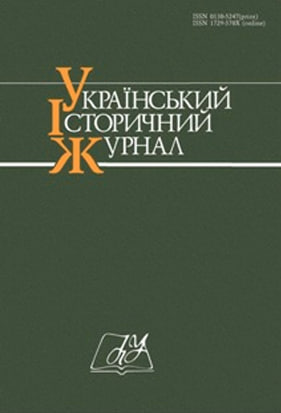Ideological Legitimation of Aggressive Wars and Construction of the Image of the Enemy in Russian Historiography
DOI:
https://doi.org/10.15407/uhj2022.04.093Keywords:
Ukrainian historiography, unscientific nature of Russian historiography, glorification of wars, war of histories, expansion, falsification, imperial ideology, image of the enemyAbstract
The purpose of the article is to contribute to the debunking of the unscientific nature of Russian historiography, its ideologization and subservience to the rulers of Muscovy, and thus of the Russian and Soviet empires, to expose the manipulative attempt of the current leaders of the Russian Federation to use arguments from history to legitimize the genocidal aggression against Ukraine, its rationale and justification, to find out motives of glorification of wars of aggression in it and creating of the image of the enemy.
The research methodology is based on systematic adherence to the principles of historicism, continuity, anthropological, sociocultural and critical-analytical approaches, refutation of falsifications and distortions in historical narratives, the involvement of methods of historiographical analysis and synthesis, comparative studies, methods of historical-chronological, historical-genetic knowledge and personal reflections.
Relevance and scientific novelty are determined by the very formulation of the problem, which in the context of the current war and its historical segment acquires special significance, as it allows a deeper understanding of the origins of the great-state essence and servile nature of Russian historiography, starting from the times of V.Tatishchev, N.Karamzin, M.Pogodin and ending with modern Kremlin historians, to more fully realize the need for the final release of Ukrainian historians from its ideological and methodological influence. For the first time, on the basis of historiographical sources, works of predecessors and author’s studies, the technologies of glorifying the role of wars in the history of Russia, creating the image of an internal and external enemy, forming hostility and hatred towards Ukraine and the Western world are analyzed.
Conclusions. The result of the research is aimed at proving the unscientific nature of Russian historiography, its appropriation, ideological commitment and bias, its appropriation of the historical and cultural heritage of the Kyivan Rus state, the debunking of post-colonial stereotypes, distortions, fabrications, arbitrary interpretation of historical sources, falsifications of the history of Russia and Ukraine, and the justification of the need to refute them. The process of replacing concepts by Russian historians, distorting facts, spreading myths, instilling stereotypes of thinking with the aim of manipulating historical consciousness and preserving Ukrainian historical science in the so-called common information space, imposing one’s vision of the historical process on it has been traced. Attention is drawn to the need to further distance Ukrainian historiography from Russian one, to oppose its worldview core – the paradigm of the “Russian World” / “Russkiy Mir”, the concepts of “one nation” and “common history”, debunking the anti-humanity of the ideology of aggressive rashism (ruscism), the falsehood and immorality of Moscow’s historical myths regarding the nature and goals of the current the war of occupation and conquest against Ukraine, silencing its genocidal direction. A number of proposals have been made regarding the further exposure of Russia’s expansionist policy under the guise of “the gathering of originally Russian lands”, its modern modifications, including its attempts to control the intellectual and informational space of historical science and education, to use it in the interests of the great powers.


